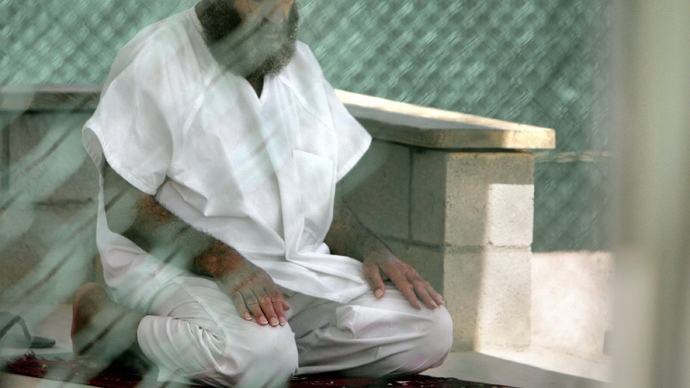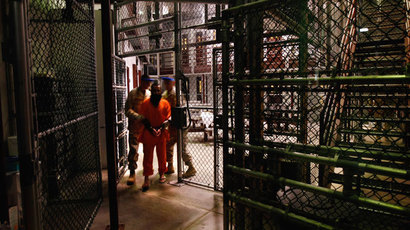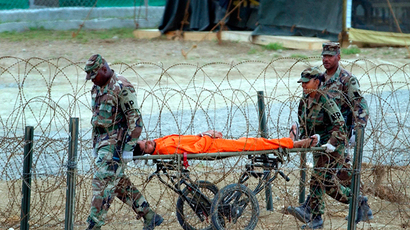Guantanamo force feeding videos must be released – US judge

Video footage of American officials force feeding inmates at the Guantanamo Bay prison complex in Cuba cannot be kept secret and must be released to the public, a federal judge ruled on Friday.
READ MORE: US wants Guantanamo force-feeding hearing to stay secret
Specifically, US District Court Judge Gladys Kessler said the US government must release 28 videos that show hunger-striking inmate Abu Wa’el Dhiab – a Syrian man who has been in custody since 2002 – being removed from his cell against his will and fed via a tube that goes through his nose and into his stomach.
The tapes will need to undergo some changes before they are released, however, in order to protect the identities of those carrying out the procedure. Faces and names on uniforms, for example, will be blurred, and other modifications may be applied to obscure voices or block out writing.
The ruling comes just one day after the same judge rejected the Obama administration’s request to keep the public from having access to an upcoming hearing related to the force feeding of an inmate on a hunger strike.
“We are very gratified by this decision, which will enable the American people to see with their own eyes the sorts of abuses that are being heaped on these peacefully hunger-striking detainees,” Dhiab’s lawyer, Jon Eisenberg, told AP.
“Once the truth is fully brought to light, we believe these terrible practices will come to an end,” he added.
READ MORE: Guantanamo Bay: An untold history of torture and resistance
Although the government is expected to appeal the ruling, it marks a significant victory for Dhiab and his defense team. Dhiab is asking the court to prohibit the military from both removing him from his cell and engaging in force feeding, a process that the inmate has likened to torture. The government adamantly denies the comparison, arguing that force feeding is necessary to keep inmates from dying of malnourishment.
At the hunger strike’s high point in 2013, up to 100 inmates were refusing to eat as a way to protest their indefinite detention. Dhiab himself has been approved for release since 2009, but he remains in custody.
READ MORE: Guantanamo Bay prison hunger strike
The government argued that releasing the videos – which had been declared classified – could potentially allow inmates to form “countermeasures” against “forced cell extractions.” Judge Kessler, however, declared these arguments to be “unacceptably vague, speculative,” or “just plain implausible,” according to the Intercept.
“Given what is already available to the public and known to the detainees, it simply is not plausible to argue that release of the videos will give rise to an additional probability of harm by encouraging the development of FCE [forced cell extractions] countermeasures,” Kessler said, as quoted by CNN.
Kessler also noted that just because classified information regarding Guantanamo had not been released before doesn’t mean that courts have no right to if they deem the situation necessary.
On Thursday, meanwhile, Kessler also denied the government’s attempt to ensure a closed hearing on Dhiab’s case, calling the Obama administration’s request “deeply troubling” and an “extraordinary step.”
“With such a long-standing and ongoing public interest at stake,” she wrote in her ruling, “it would be particularly egregious to bar the public from observing the credibility of live witnesses, the substance of their testimony, whether proper procedures are being followed, and whether the Court is treating all participants fairly.”
READ MORE: Obama and Pentagon at odds over Guantanamo closure














